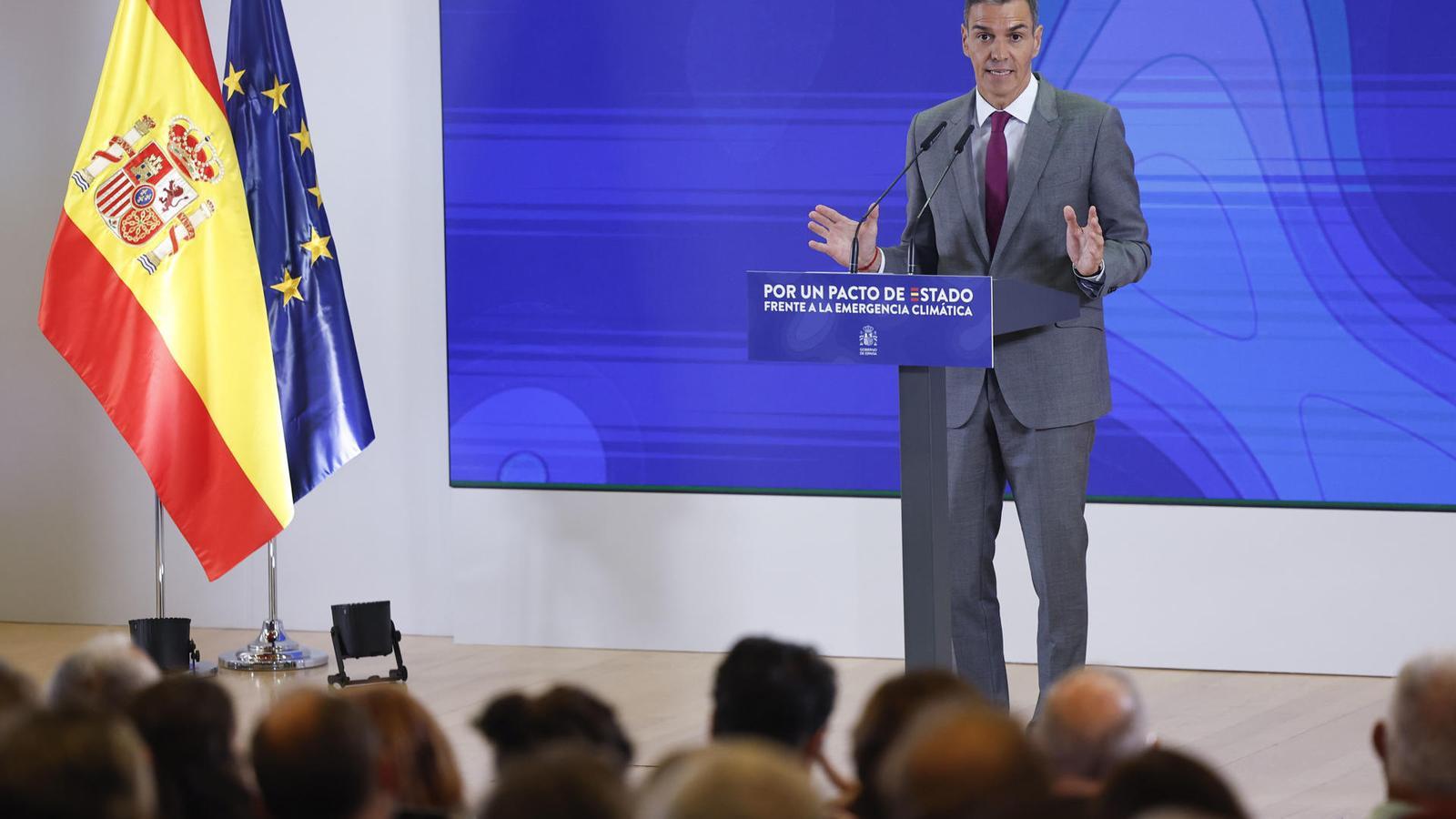A state agency for emergencies: Sánchez's proposal to combat fires
The PP leader proposes reforming the Constitution to prevent more than two consecutive budget extensions.


MadridPedro Sánchez kicked off the political year this Monday by attempting to seize the initiative and putting the People's Party (PP) in a difficult position. Following the largest wave of fires in Spain, the Spanish president outlined the 10 basic measures of a state pact to combat the climate emergency, which, among other things, includes the creation of a state emergency agency and strengthening firefighters and forestry personnel. The goal is to reach an agreement with the main opposition party and the rest of the political parties, social stakeholders, the scientific community, and, ultimately, civil society. "It may seem naive to call for a state pact, but I will defend possibility and optimism as the only two possible attitudes to move Spain forward," emphasized the head of the Spanish government, aware that the last thing Alberto Núñez Feijóo is interested in is moving away from the strategy of constant disruption and bringing it down. In fact, the PP leader was quick to distance himself from the proposal and argued that what Sánchez should do is present a budget.
Sánchez's presentation took place at the headquarters of the Ministry of Ecological Transition, in front of practically the entire Council of Ministers, the leaders of the CCOO and UGT (Spanish Workers' Union), and representatives of employers' associations and chambers of commerce, among others. "When we've wanted to, we've been able to do it. We have to live up to what the country demands. Turn off the noise, sit down and listen to each other, negotiate and dialogue," Sánchez urged, who compared this proposal for a state pact to those previously achieved against gender-based violence or terrorism. In fact, some of the measures that Feijóo put on the table last week—with the exception of the telematic bracelet against arsonists– are not so far removed and fit with what the rural world has been demanding in recent weeks. "Of course we must listen to environmentalists, but also to the primary sector," he noted.
In parallel, Feijóo gathered the PP leadership in Aranjuez to establish an opposition strategy to Sánchez, which, in a subsequent appearance, he made clear does not involve any state pact with the PSOE. The PP president attacked the "weakness" of the Spanish government, which he sees as tied hand and foot, and demanded that it approve a budget for 2026 if he intends to remain in power. If it does not do so, Feijóo called for elections and announced that he will fight against the "budgetary despotism" of Sánchez, who governs with the 2023 budget extended. Given this and the possibility that the Spanish government will end the term without approving other budgetary measures, Feijóo has commissioned a report to study a legal change that would prevent more than two consecutive budget extensions. "It is unacceptable that any government can do whatever it wants," he stated. Feijóo explained that the modification would affect the general budget law and the Constitution and would imply the automatic dissolution of the Spanish Parliament and the calling of elections before a third extension is reached.
Sánchez's State Pact
Among the proposals, the obligation for all administrations to commit to maintaining the necessary human and technical resources to prevent and combat extreme weather events, 365 days a year, stands out. "It's pointless to save 1 euro on prevention to allocate 100 euros to extinguishing and recovery," summarized Sánchez, who called for providing fire departments and rural agents with sufficient vehicles and technology. He also proposed the creation of a state emergency and civil protection agency with the aim of improving coordination between administrations when dealing with climate-related disasters. "The Emergency management is more effective from a decentralized perspective, but it works better the more coordination instruments there are," he stressed. Reforestation of mixed forests, efficient irrigation, extensive livestock farming, and financial support for bioeconomy programs, etc. An "arsonist plot"?
The Spanish president has stressed that this summer's fires "are not the result of chance or an arson plot, as the hoaxsphere", Rather, they are the result of three factors. Sánchez summarized them, firstly, as a lack of prevention plans and under-equipped firefighter and forestry teams; "inadequate land management with forests overly laden with biomass, neglected roads, depopulated municipalities, and obsolete infrastructure," and, finally, a climate emergency whose "undeniable impact has made the fires so lethal."
Sánchez was preceded in speaking by the Third Vice President of the Spanish Government, Sara Aagesen; the Minister of Agriculture, Luis Planas; and the Minister of the Interior, Fernando Grande-Marlaska. Aagesen emphasized that this summer's fires and the record temperatures of the last three years have demonstrated that climate change "is hot on our heels" and that it is time to act in rural areas. In this regard, Planas advocated for greater budgetary allocation for the primary sector, which is "key to addressing the climate emergency." "Some people insist on seeing the ecological transition as a reality contrary to the interests of agricultural professionals. But it's exactly the opposite," Planas emphasized, advocating for better forest management because they are "less vulnerable to fires."
